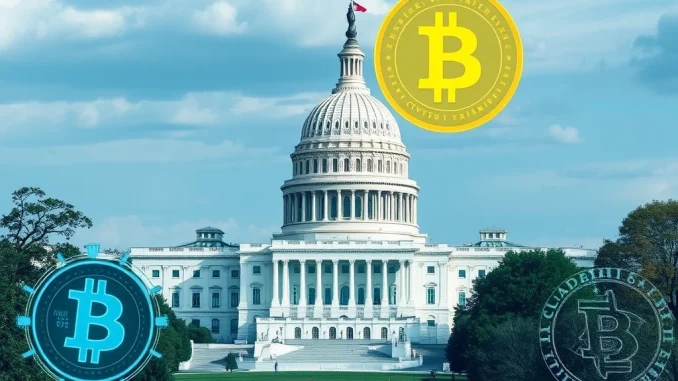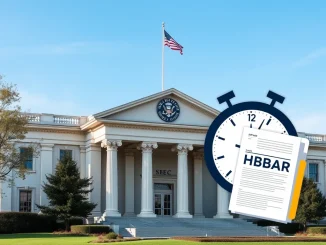
Major developments are unfolding in the realm of cryptocurrency regulation within the United States. The ongoing efforts to establish clear rules for digital assets have hit a new point of discussion, specifically regarding stablecoins. This news directly impacts anyone following the evolving landscape of US stablecoin regulation.
What’s Happening with the GENIUS Act in the US Senate?
A group of influential lawmakers in the US Senate is making a significant move. They plan to introduce an amendment to a proposed law known as the GENIUS Act. This bill is specifically designed to bring regulatory clarity to the stablecoin market. Senators Chuck Schumer, Elizabeth Warren, and Jeff Merkley are spearheading the push for this addition.
Their motivation stems from specific concerns they believe need addressing to ensure the integrity and fairness of future stablecoin frameworks. The proposed amendment is intended to prevent potential conflicts of interest and undue financial gain from specific projects.
Addressing Concerns Around World Liberty Financial and Potential Profits
A key driver behind the proposed amendment involves the DeFi project World Liberty Financial (WLFI) and its associated stablecoin, USD1. The Senators have voiced concerns that, without the protective clause they are seeking to add, the Trump family could potentially benefit, either directly or indirectly, from this particular project and its stablecoin.
This highlights a critical challenge in crafting effective regulation: ensuring that personal financial interests do not improperly influence or benefit from the legislative outcomes designed for the broader market. The amendment aims to erect a safeguard against such possibilities, reinforcing the need for transparency and impartiality in the digital asset space.
Understanding the Core of the Stablecoin Bill: The GENIUS Act
The stablecoin bill itself, the GENIUS Act, lays out fundamental requirements for entities that issue stablecoins in the U.S. Its primary goals are centered around stability, consumer protection, and financial integrity. If enacted in its current form, or with proposed amendments, it would set important precedents for how stablecoins operate legally within the country.
Key requirements outlined in the GENIUS Act include:
- Requiring stablecoin issuers to obtain appropriate licenses from regulatory bodies.
- Mandating that issuers maintain 100% reserves, meaning they must hold an equal amount of high-quality, liquid assets backing the stablecoins in circulation.
- Enforcing strict disclosure requirements, compelling issuers to provide clear and regular information about their reserves, operations, and financial status to regulators and the public.
These measures are intended to mitigate risks associated with stablecoins, such as potential runs on reserves or lack of transparency that could harm users and the broader financial system.
The Significance of US Stablecoin Regulation
The passage of a comprehensive US stablecoin regulation bill like the GENIUS Act could serve as a crucial benchmark, not just for the United States, but potentially for other jurisdictions considering how to regulate this growing segment of the crypto market. The outcome of this legislative process, including whether the proposed amendment is adopted, will significantly shape the future operating environment for stablecoins and influence investment and adoption trends.
The debate around the amendment underscores the complex interplay between policy-making, potential conflicts of interest, and the rapid evolution of financial technology. As the bill moves through the legislative process, stakeholders across the crypto industry, traditional finance, and the public will be watching closely.
Summary: What This Means for the Future
The proposed amendment to the GENIUS Act by key US Senate figures signals the ongoing effort to refine and strengthen cryptocurrency regulation. By seeking to address specific concerns related to projects like World Liberty Financial and potential financial conflicts, Senators aim to ensure the foundational stablecoin bill provides robust, equitable US stablecoin regulation. The outcome of this legislative push will be pivotal in determining the framework for stablecoins and setting a precedent for how the U.S. manages digital asset risks and opportunities going forward.



